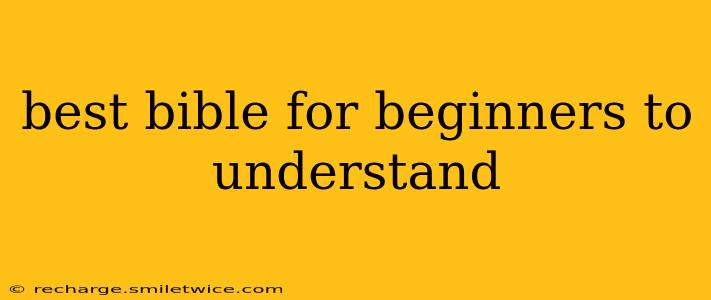Choosing your first Bible can feel overwhelming. With countless translations, versions, and formats available, finding the right one to unlock the world of scripture can seem daunting. This guide aims to simplify the process, helping beginners select a Bible that's both accessible and engaging. We'll delve into various factors to consider and address common questions beginners often have.
What Makes a Bible "Beginner-Friendly"?
A beginner-friendly Bible prioritizes clarity and readability. It avoids archaic language, opting for modern phrasing that resonates with contemporary readers. Good introductory Bibles also often include helpful features such as:
- Easy-to-understand language: Translations that use contemporary English are key.
- Clear formatting: Sections are well-defined, with verse numbers clearly visible.
- Helpful introductions and notes: These provide context and explain difficult passages.
- Study Bibles (for some): While not essential for all, study Bibles offer extra insights and explanations, enriching the reading experience. However, avoid those with overly dense or academic commentary for your first experience.
What are the Best Bible Translations for Beginners?
Several translations excel at clarity and accessibility. Here are a few popular choices:
-
New International Version (NIV): A widely respected and popular choice known for its balance of accuracy and readability. It's a good all-around option.
-
English Standard Version (ESV): This translation prioritizes accuracy to the original texts while remaining relatively accessible. It offers a slightly more formal tone than the NIV.
-
New Living Translation (NLT): Known for its highly readable and contemporary language, the NLT prioritizes clarity above all else. It sacrifices some literal accuracy for readability.
-
The Message (MSG): A highly paraphrased translation, the Message aims for maximum clarity and contemporary relevance. It's a great choice for those who want to grasp the overall meaning quickly. However, it moves significantly from the original text and shouldn't be considered a precise translation.
The best translation for you will depend on your personal preferences. Consider reading sample passages from a few different translations to see which style best suits your reading style.
What Type of Bible is Best for Beginners?
Beyond the translation itself, consider the Bible's physical format and additional features:
-
Paperback Bible: Affordable and portable, perfect for reading on the go.
-
Hardcover Bible: More durable and often includes better-quality paper, leading to a more pleasant reading experience.
-
Study Bible: These offer in-depth commentary, cross-references, maps, and other resources to enhance understanding. While excellent, they might feel overwhelming for complete beginners. Consider a simpler version for initial reading, and then transition to a study Bible later.
-
Large Print Bible: Ideal for those with visual impairments or who prefer larger text.
What Should I Look for When Choosing a Beginner's Bible?
H2: Does the Bible include maps and timelines?
Yes, many Bibles, particularly study Bibles, include maps and timelines to provide historical and geographical context. These visual aids can be invaluable in understanding the narratives and locations mentioned in the Bible.
H2: Are there any helpful introductions or notes included?
Yes, many beginner-friendly Bibles contain introductory sections that explain the structure of the Bible, different genres of literature used, and the historical background. These introductions can greatly aid in understanding the overall context. Some Bibles also include notes explaining difficult or complex passages.
H2: Is there a particular edition that is considered best for beginners?
There isn't one single "best" edition. The ideal Bible for a beginner depends on personal preferences for readability and study aids. The translations listed above (NIV, ESV, NLT, MSG) all offer versions suitable for beginners, and many have different editions (e.g., with or without study notes). Looking at sample pages of each is recommended.
H2: How do I find a good commentary or study guide to help me understand the Bible?
Many excellent commentaries and study guides are available, both in print and online. If you opt for a study Bible, the integrated notes will act as a helpful study guide. For external resources, look for commentaries written by reputable scholars and that suit your reading level. Avoid overly academic or theological commentaries for your first attempts at study.
In conclusion, selecting your first Bible is a personal journey. Prioritize clarity, readability, and features that support your learning style. Start with a few sample passages from different translations to find the perfect fit and embark on your enriching exploration of scripture!
